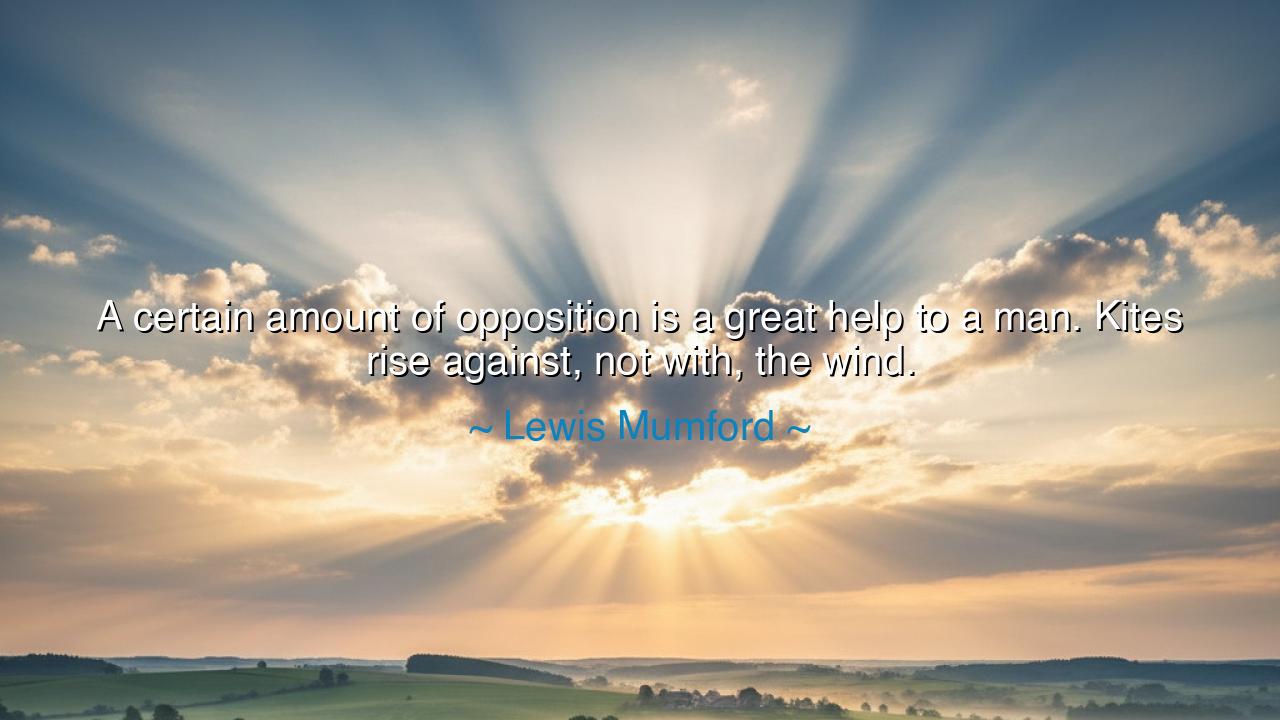
A certain amount of opposition is a great help to a man. Kites
A certain amount of opposition is a great help to a man. Kites rise against, not with, the wind.






“A certain amount of opposition is a great help to a man. Kites rise against, not with, the wind,” wrote Lewis Mumford, and in that image lies a truth so timeless that it could have been spoken by the sages of old. The kite — light, fragile, and bound by a thin string — does not soar in still air. It rises only when the wind resists it, when the invisible force that seems to oppose it becomes, in fact, the very thing that lifts it higher. So it is with the human spirit: without struggle, there is no ascent; without resistance, no strength; without opposition, no greatness.
Mumford, a philosopher of cities and civilizations, understood that progress is born not in comfort but in conflict. He saw that every soul, like the kite, must meet the winds of adversity to discover its true capacity for flight. The smooth path, though it tempts us with ease, makes us soft and dull. It is only in pushing against challenge that we learn who we are. The ancients taught the same — that the gods test those they intend to raise, and that the finest steel is forged in fire. Adversity, therefore, is not the enemy of man, but his greatest teacher.
Consider the story of Nelson Mandela, who spent twenty-seven years in prison, robbed of youth, family, and freedom. Yet it was within that confinement, under the harsh winds of oppression, that his soul grew vast enough to embrace forgiveness instead of hatred. When he emerged, he did not break beneath the storm — he had learned to rise against it. Like a kite that strains against its string but never loses its direction, Mandela’s struggle made him not bitter, but strong, steady, and luminous. Without that resistance, his greatness might have remained hidden, dormant as windless paper.
Even in the world of invention and discovery, the pattern holds true. When Thomas Edison failed a thousand times before creating the lightbulb, he was not defeated by those failures — he was elevated by them. Each failure was a gust of wind pressing against him, and with each push, he learned to balance, to adjust, to ascend. So, too, with every artist, warrior, or dreamer who has faced rejection and pain: it is the very force that resists them that grants them the power to reach the heights they seek. The calm air of ease teaches nothing; it is the headwind of hardship that reveals genius.
This truth must not only be admired but lived. For every man and woman will face their own winds — of doubt, of loss, of injustice. In those moments, it is easy to wish for stillness, for calm skies and easy days. But remember the kite: it does not soar by fleeing the wind, but by embracing it. The same wind that threatens to tear it apart is the one that lifts it to heaven. So too must we meet our opposition not with despair, but with defiance — not asking for a lighter burden, but for broader wings.
Opposition, then, is not punishment; it is proof that you are in motion. The wind only meets those who try to rise. Those who never move, who never strive, will never feel the wind’s force — but neither will they ever taste the sky. It is the way of life that greatness is born in friction, that the soul deepens when challenged, and that true peace is found not in stillness, but in mastery of the storm.
So, my child, when the winds of hardship blow, do not curse them. Lift your head as the kite lifts its frame. Let resistance teach you balance. Let struggle teach you grace. Every gust that pushes against you is also pushing you upward — if only you learn to use it. The world will test your spirit again and again; welcome it as the breath of destiny. For in the end, it is not the calm skies that shape the strong, but the winds that dare you to rise. And those who do — those who face the storm — shall find themselves soaring higher than they ever dreamed.






AAdministratorAdministrator
Welcome, honored guests. Please leave a comment, we will respond soon